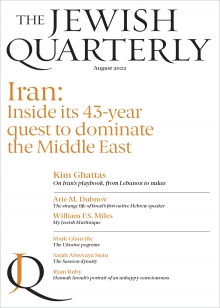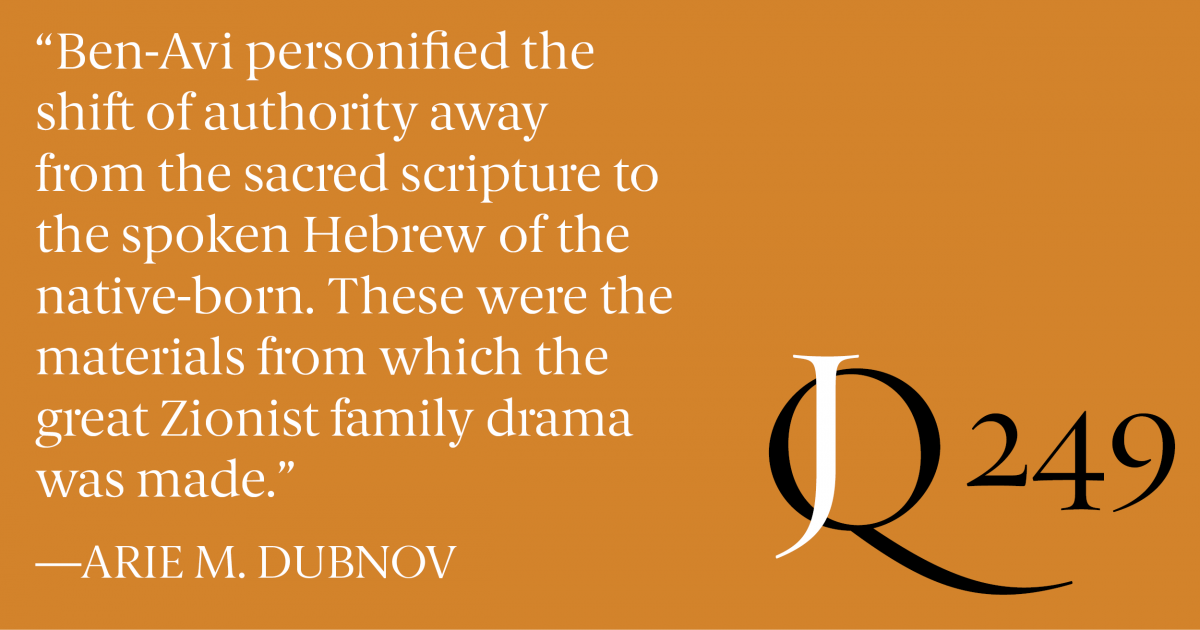
This extract is featured in The Jewish Quarterly 249: Iran.
To read the full issue, log in, subscribe or buy the issue.
Like most Jewish Israelis of my generation, I was familiar with the name Itamar Ben-Avi first and foremost thanks to his role as the “son of ”: he was born Itamar Ben-Zion (literally “son of Zion”), the eldest son of Deborah and Eliezer Ben-Yehuda, the famous Zionist lexicographer and journalist who acquired, rightly or wrongly, the status of “reviver” of the Hebrew language as a modern vernacular. It was from his entrepreneurial, restless father, who founded several newspapers and associations to spread his views in favour of national and linguistic renewal, that Itamar Ben-Avi learned the power of the written word and the importance of the free press. Yet Ben-Yehuda senior was also a short-tempered and exceedingly strict parent. He treated his firstborn as part of his cultural nation-building project, homeschooling him and prohib- iting contact with other children to make him the first Ashkenazi child to speak uncontaminated modern Hebrew. The experiment yielded the expected results: at the age of three, Itamar uttered his first word, aba (father); at eleven years old, he sent Lord Rothschild a letter notifying him about his plans to establish a Hebrew army; and when he was fifteen years old, he launched his own Hebrew-language newspaper, called Hayeled (“The Child”), which his parents, unhappy with its contents, closed down after its first issue.
We learned about this youthful melodrama in elementary school, from Ha-Bechor Le-Beit Avi (translated as Rebirth: The Story of Eliezer Ben-Yehudah and the Modern Hebrew Language), a sanitised version of the story produced by Dvora Omer, a popular children’s novelist, which entered school curricula and remains in circulation to this day. Omer’s sentimental, though somewhat preachy, account of the child blossoming to maturity meant to inculcate in us, the pupils, the correct ideological messages: continue the courageous struggles for a Hebrew language and culture, away from the customs of the Galut and the philanthropy-dependent “old Yishuv”, and the ongoing effort to forge a new and independent Hebrew subject, bold and proud. Itamar Ben-Avi, in other words, was the epitome of the native-born Palestinian Jew, a Sabra before the term was even thought of, who personified the shift of authority away from the sacred scripture to the spoken Hebrew of the native-born.These were the materials from which the great Zionist family drama was made.
Itamar Ben-Avi would spend much of his adult career as a journalist, and, like his father, he coined numerous words that are still in use in contemporary Hebrew. A partial list includes the Hebrew words for statesman (medinai), armoured vehicle (meshurian), budget (takziv), telegram (mivrak), greenhouse (hamama), defeatism (tvustanut) and even contemporary (akhshavi). He also coined the Hebrew term atzmaut (עצמאות). But what was atzmaut? Most dictionaries would translate the word as independence: the state of being not dependent, a condition of being free from external control. But was this really what Ben-Avi meant?
Many years after elementary school, already a parent myself, I picked up Ben-Avi’s posthumously published memoir. Cryptically titled Im Shachar Atzma’utenu (With the Dawn of Our Atzmaut), it described the pressures placed on him by his demanding father with his strict didacticism and constant attempts to evade societal pressures, and his struggle to forge his own individuality, independent style and desires. The memoir was the Hebrew equivalent of John Stuart Mill’s famous autobiography, and I realised that beneath the filial admiration, it highlighted Ben-Avi’s struggle for autonomy, free from the yoke of the much-revered authority figure, and weaved his own story with that of the Jewish national movement, just as Mill made his personal emancipation story a platform on which he later placed his liberal philosophy. And yet even the pen name he adopted – Ben-Avi, constructed from an acronym of his father’s name – expressed a filial devotion. The word atzmaut – derived from the Hebrew word for self (atzmi, עצמי) – featured in the title of his autobiographical Zionist bildungsroman, a narration of Ben-Avi’s journey to find his “self”.
After a short stint as a teacher in Jaffa, Ben-Avi started his journalistic career early, as an editor at his father’s newspapers. He witnessed, with much enthusiasm, albeit from a provincial distance, the late-Ottoman Tanzimat reforms and the emergence of the Arab Nahda (“awakening”), which led to mass readership and the creation of distribution channels for printed texts. He made his first professional steps as a participant in this vibrant intellectual scene and, like his father, embraced the 1908 Young Turk Revolution. “Never was the Messiah so close, so dependent on our deeds, as he is today,” Eliezer Ben-Yehuda wrote in his newspaper Ha-Tsvi, calling upon his fellow Jews, the majority of whom were foreign nationals, to acquire Ottoman citizenship and enfranchisement. (The Zionist Palestine Office estimated there were between 45,000 to 50,000 Jews living in Jerusalem in the early twentieth century, whereas the US Consulate in Jerusalem estimated their number reached 60,000. However, the 1905 Ottoman census counted only 13,441 Jews with Ottoman citizenship.)
The feeling that the Ottoman Empire had transformed from absolutist rule into a quasi-liberal parliamentary democracy triggered lofty expectations of Jewish civic integration. Unlike the European nation-states, where integration and civil equality were regarded ambivalently, and were premised on shedding com- munal identities, the post-1908 Ottoman regime was regarded as pluralistic, allowing Jews, Greeks, Armenians and Turks, and Arabs alike to breathe the same fresh air of freedom while keep- ing communal autonomy. The call of “Jews, become Ottomans!” was promoted in the family’s newspapers, and Ben-Avi’s memoir, despite being written years later, did not conceal his excitement at meeting Mustafa Kemal Atatürk in 1911. In 1914, with the out- break of World War I, he toyed with enlisting in the Ottoman army. His audacious – though futile – attempt to Latinise the Hebrew alphabet was also inspired by the Turks, who introduced the Türk alfabesi, a new 29-letter Latin-script Turkish alphabet.
However, Ben-Avi’s admiration for Atatürk cooled after the family’s newspaper was closed by the Ottoman authorities in 1915. Though no official reason was given, Ben-Avi admitted that the paper was sympathetic to France and Britain, and the family temporarily relocated to the United States. When Palestine switched hands and was occupied by the British, Ben-Avi and his father adapted to the radically new political circumstances with the same zeal that Ottomanisation had inspired. They regarded the Balfour Declaration as the dawn of a new age, going as far as to suggest that the Zionists should create their own calendar, considering “Balfour Day” (2 November 1917) as year zero, from which the counting of time should commence – a Jewish nationalist tribute to the French revolutionary calendrier républicain. Even his journalistic style became more English: wishing to replicate the commercial success of Lord Northcliffe’s Daily Mail – notorious for its hyperbolic style and unabashed promotion of jingoistic imperialist politics – in 1919 Ben-Avi founded the daily Doar Hayom (Daily Mail), which quickly acquired a similarly questionable reputation. Respectability was not his prime concern. The newspaper was designed to whet readers’ appetites for sensational stories, to provide quick answers to complicated problems and to serve Ben-Avi’s penchant for the epic and melodramatic. Asked to compare his newspaper to Haaretz, the reputable competitor known for the quality of its writers (also established in 1919), Ben-Avi reportedly quipped, “Haaretz may be a decent newspaper, but it is not a newspaper; Doar Hayom may not be decent, but it is a newspaper!” Perhaps.
More than reporting about local and world events, Doar Hayom provided Ben-Avi with a platform to promote his own, often idiosyncratic visions for the future of the region. Early on, he promoted what came to be known as the “Cantonisation plan”: the division of Palestine into separate autonomous zones for Muslims, Christians and Jews, modelled after the Swiss Confederation. Canton Judea, the Jewish district he envisioned, was not centred around Jerusalem but stretched along the shores of the Mediterranean, consisting of Tel Aviv and Netanya, a city 30 kilometres north of Tel Aviv that he helped found in 1928. The plan was compared to the Irish Free State (which was still, at that stage, a dominion state that had not seceded from the British Commonwealth and whose citizens were expected to declare their fidelity to the British crown) and described as the most pragmatic solution to settle Arab–Jewish strife. Ben-Avi even went so far as to offer an accompanying interpretation of the Old Testament, arguing that the ancient Israelites were a talented and audacious seafaring people, and thus the Judean canton would provide a unique opportunity to restore Jews to the sea and to “re-Hebraise” the Mediterranean.
Outlandish as these ideas may appear to us, they did not fall on deaf ears. The Palestinian-Arab intellectual Ahmed Saleh Al-Khalidi was open to the possibility of converting Palestine into an Arab-Jewish confederation and proposed in 1934 that Jerusalem, Hebron, Safad, Nazareth and Bethlehem would be declared “neutral and holy” cities, with the latter two being attached to the Arab canton. British administrators such as L.G. Archer Cust and D.G. Harris also followed these discussions, and came up with their own preliminary “redistricting” plans, which ultimately provided a basis for the 1937 and 1947 partition plans.
In this fleeting “confederal” moment of transition between empires, the word atzmaut was born. The standard translation of atzmaut as “independence” – a political state of being separate, sovereign and divorced from a broader conglomerate – is, in fact, a mistranslation. Since there was already a Hebrew word indicating dependency (tlut), there was no need to coin a new term to describe the lack of dependence, a state of i-tlut. As Ben-Avi explained in his memoir, atzmaut was coined when he was searching for a modern Hebrew word for autonomy: a political condition of self-governance, not in isolation but within a broader entity such as a federation, commonwealth or empire. It was a nationalist daydream, centred around notions of developing autonomous Jewish life that would contribute to a culture of coexistence, rich with ethnic and religious diversity. ▤
SUBSCRIBE NOW to view the full essay.






